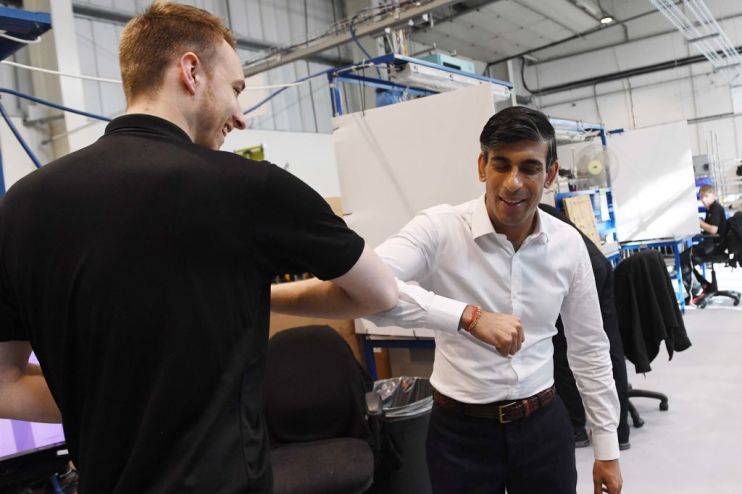Could AI help Rishi Sunak revive the UK economy?

This was once meant to be the year the government balanced the books, a literal pay off for years of tight purse strings under George Osborne’s austerity programme. Instead, 2020 has seen government debt balloon to over £2 trillion.
The coronavirus pandemic has meant UK spending has rocketed far beyond any previous peacetime records, leaving the deficit at an all-time high.
Rishi Sunak, the nation’s new favourite Tory, has gone far beyond even Jeremy Corbyn’s wildest dreams in turning on the spending taps amid a lockdown that has sunk the UK into its deepest recession on record.
Under Sunak, the Treasury has forked out over £34bn on a furlough scheme credited with avoiding mass unemployment, and underwritten the vast majority of £53.5bn of loans to keep struggling businesses afloat, not to mention numerous bailouts and tax breaks to companies, investors and house buyers to keep the economy treading water.
However, now the worst appears to be over, it is widely acknowledged that taxes will have to rise to narrow the huge black hole in the government’s coffers.
But the chancellor faces a tricky balancing act knowing when and how to do it in a way that avoids inhibiting growth or hurting people most impacted by the pandemic.
No doubt Treasury economists are mooting various ideas, some of which have already been leaked: an online sales tax to protect ailing high streets; prolonging the stamp duty cut to prop up house prices; and hiking VAT as the economy recovers to claw back much-needed tax receipts.
Other, more controversial ideas like a wealth tax are likely to prove anathema to traditional Tory voters, but these are extraordinary times and it is unlikely Sunak will have ruled anything out.
While Sunak has an army of civil servants busy modelling an enormous number of scenarios to help him decide what will work best, it’s unlikely any of them is an AI.
Tech giant Salesforce is working to change that.
The Silicon Valley software firm was experimenting with its very own AI Economist even before coronavirus to model economic theories. In short, it seeks to supplement economic ideologies with data to help politicians find the most effective tax policies.

Since the pandemic, the project’s leaders are using the algorithm to see what policies would prove most effective in inspiring an economic recovery.
“We’ll need a lot of new thinking and technology to help get us out of the pandemic slump,” says Stephan Zheng, a lead research scientist on the AI Economist project.
The project uses machine learning to model not only the economic levers being pulled, but also how citizens react.
“The way economists do that normally is in a very aggregate way,” Zheng tells City A.M. “They write down a model of labour and how that responds to taxation.”
Where the AI Economist is different is in its use of machine learning to simulate “economic agents” – you and I – who have differing motivations that make it harder to paint economic policy in such broad brush strokes.
“It’s acting in a world we simulate. You can have a model of an economic worker who cares about working, but not working too much,” Zheng posits. “So what’s the right behavioural model for that?
“One way is to let them act to optimise their own lifetime and happiness – how would they respond to a policy?”
Finding loopholes
That offers economists a much more complex, and comprehensive, picture of how a society will react to a particular taxation system.
David Parkes, a computer scientist at Harvard University who is involved with the project, explains: “You all have different trade-offs as you can consider what people think about their family and their country and populate those in and get the AI to optimise for certain goals.”
It also means Salesforce’s AI workers adapt to the model’s various tax policies to find ways to dodge tax or lower how much they pay – a virtual Cayman Islands probably exists in one simulation.
The AI policymaker can then tweak its policies as it learns from workers’ reactions.
Modelling a pandemic

The advantage of using AI is it allows economists to experiment with many different economic models over a short period of time, substituting economic ideology for data on what policy delivers the best result.
That is a clear benefit at a time when a virus has wrecked the world’s current economic model. People are frequenting city centres much less now they are working from their kitchen tables, and it is hard to know how long the knock-on impact on property, retail and travel will linger.
But the unprecedented nature of the pandemic means economists are playing something of a guessing game when it comes to tax policy.
Using a data-driven AI to help might well help economists make more accurate predictions, Salesforce hopes.
“One advantage of an AI-powered simulation though is that you can tweak parameters to explore different scenarios,” Zheng adds.
“For example, more abstractly one could potentially model the impact of a pandemic by adding constraints like social distancing and restricted access to resources, or modifying the workforce.”
The tool could also make up for the lack of historical comparisons by allowing economists to run a multitude of simulations over a short timespan to discover what policies are most effective.
“If you have an epidemic in a world where many people work remotely… that is likely to have wide-ranging consequences for the economy,” Parkes says. “We are looking at how do you use this tool to quickly understand what’s happening without waiting for 15 years of data.”
Scaling up
However, one of the tool’s main drawbacks is its small number of economic agents. The team is working towards creating 100 workers to simulate citizens. But Zheng believes that long term, the number will hit at least the tens of thousands: Monaco, the world’s smallest nation state, has a population of around 40,000.
The other next step for Salesforce is to work with economists to develop the system.
“To advance economics we want to let economic theorists develop new ideas of economic systems by using this technology as well,” Parkes says.
Salesforce has designed the AI Economist as an open source project, and is now inviting AI researchers, economists and policy experts to get involved.
“A lot of the success of the model will come from researchers, policy makers, academics and others who can add their own objectives,” Zheng explains.